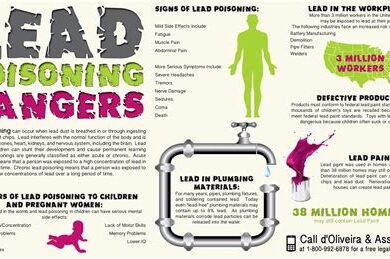
Lead Poisoning Symptoms
Lead Poisoning Symptoms

Lead poisoning is a serious and potentially deadly condition that can result from exposure to high levels of lead. Lead is a toxic substance that can be found in many products, including paint, pipes, and some types of jewelry.
Symptoms of lead poisoning vary depending on the level of exposure and the age of the person affected. In children, lead poisoning can cause developmental delays, learning problems, irritability, and loss of appetite. They may also experience fatigue and abdominal pain. In severe cases, seizures, comas, and even death may occur.
Adults who are exposed to high levels of lead may experience symptoms such as headaches, joint pain, memory loss, and decreased sperm count. Pregnant women who are exposed to lead can suffer miscarriages, premature births, and other complications.
If you suspect that you or someone you know has been exposed to lead, it’s important to seek medical attention immediately. A blood test can determine if there are elevated levels of lead in the body.
Treatment for lead poisoning involves removing the source of the lead and reducing the amount of lead in the body. Chelation therapy is a process where a medication is given to help remove the lead from the body. In severe cases of lead poisoning, hospitalization may be necessary.
Prevention is the best way to avoid lead poisoning. To minimize your risk of exposure, avoid products that contain lead, wash hands frequently, and keep your home clean and dust-free. If you live in an older home, have your water and paint tested for lead.
In conclusion, lead poisoning is a serious condition that can have devastating effects. Recognizing the symptoms and seeking medical attention early can help prevent further damage. By taking preventative measures, we can reduce our risk of exposure and protect ourselves and our loved ones from the harmful effects of lead.
Cardiovascular Symptoms of Lead Poisoning

Lead poisoning is a condition that occurs when lead accumulates in the body, leading to various health complications. Lead is a toxic metal found in many consumer products, including paint, batteries, and pipes. High levels of lead exposure can result in cardiovascular symptoms, among other health issues.
One of the main cardiovascular symptoms of lead poisoning is hypertension or high blood pressure. Studies show that people with high levels of lead in their bodies are more likely to develop hypertension than those with low levels. The mechanism behind this correlation is not fully understood, but it is believed that lead damages the blood vessels, making them less elastic and more prone to constriction.
Another cardiovascular symptom of lead poisoning is an increased risk of heart disease. Lead exposure has been linked to an increased risk of heart attack, stroke, and other types of cardiovascular disease. Researchers believe that lead may contribute to heart disease by promoting inflammation in the body and increasing oxidative stress, which damage the blood vessels and increase the risk of plaque build-up.
In addition to hypertension and heart disease, lead poisoning can also cause arrhythmias or irregular heartbeats. This is because lead can disrupt the electrical signals that control the heart’s rhythm, leading to abnormal heartbeats. Symptoms of arrhythmias include palpitations, dizziness, and fainting spells.
It’s important to note that the cardiovascular symptoms of lead poisoning may not be noticeable until significant damage has occurred. Therefore, it is crucial to take preventative measures to avoid exposure to lead. This includes avoiding products that contain lead, such as old paint and certain types of ceramics, and following safe practices when handling lead-containing materials.
In conclusion, lead poisoning is a serious condition that can have harmful effects on various body systems, including the cardiovascular system. The cardiovascular symptoms of lead poisoning include hypertension, heart disease, and arrhythmias. To prevent lead poisoning and its associated health complications, it’s essential to take precautions to avoid lead exposure, especially in high-risk populations like children and pregnant women.
Hematological Symptoms of Lead Poisoning
Lead poisoning is a serious condition that can cause a wide range of symptoms, including those affecting the hematological system. Hematological symptoms of lead poisoning occur when the body is exposed to high levels of lead over an extended period of time. Here’s what you need to know about this type of poisoning.
One of the most common hematological symptoms of lead poisoning is anemia. Anemia occurs when there are not enough red blood cells in the body to carry oxygen to the various organs and tissues. This can result in fatigue, weakness, shortness of breath, pale skin, and dizziness. Lead can interfere with the production of red blood cells, leading to anemia.
Another hematological symptom of lead poisoning is leukocytosis. This occurs when there are too many white blood cells in the body. White blood cells are responsible for fighting off infections, but too many of them can be harmful. When the body is exposed to lead, it can trigger an immune response that leads to the overproduction of white blood cells.
Thrombocytopenia is another hematological symptom of lead poisoning. This occurs when there are not enough platelets in the blood. Platelets are responsible for clotting, so low levels of platelets can lead to excessive bleeding and bruising. Lead can damage the bone marrow where platelets are produced, leading to thrombocytopenia.
Lead poisoning can also affect the coagulation system. It can increase the risk of developing blood clots, which can be dangerous if they travel to other parts of the body. In addition, lead can interfere with the function of proteins involved in blood clotting, leading to abnormal bleeding.
In conclusion, hematological symptoms of lead poisoning can be severe and potentially life-threatening. If you suspect that you or someone you know has been exposed to lead, it’s important to seek medical attention right away. Early detection and treatment can help prevent serious complications.
Renal Symptoms of Lead Poisoning
Lead poisoning is a serious health issue and can cause various symptoms that can affect different organs of the body. One of the vital organs that can be affected by lead poisoning is the kidneys. In this article, we will discuss the renal symptoms of lead poisoning.
The kidneys are responsible for maintaining the balance of fluids and electrolytes in our body. When they get affected by lead poisoning, it can result in various renal symptoms. One of the common renal symptoms of lead poisoning is proteinuria. It is a condition in which an excessive amount of protein is excreted in the urine. Lead poisoning can damage the kidneys’ filtering system, which causes protein to leak into the urine.
Another renal symptom of lead poisoning is hematuria, which is the presence of blood in the urine. The lead can damage the blood vessels in the kidneys, causing them to leak blood cells into the urine. Hematuria can also be caused by other factors, such as kidney stones or infections. However, if you have been exposed to lead, it is essential to get your kidney function tested.
Lead poisoning can also cause hypertension, which is high blood pressure. Hypertension occurs when there is an increase in the resistance of blood flow through the arteries. Lead poisoning can damage the arteries that supply blood to the kidneys, leading to hypertension.

In conclusion, lead poisoning can cause various renal symptoms that can affect kidney function. Proteinuria, hematuria, and hypertension are among the most common renal symptoms of lead poisoning. If you suspect that you have been exposed to lead, it is crucial to get a medical evaluation and have your kidney function tested. Early detection and treatment can help prevent further damage to your kidneys and improve your overall health.
Reproductive Symptoms of Lead Poisoning
Lead is a highly toxic metal with widespread use in industrial processes, consumer products, and building materials. Exposure to lead can cause serious health problems, especially in pregnant women, infants, and young children. Reproductive symptoms of lead poisoning are a particular concern, as they can affect the growth and development of fetuses and young children.
Lead exposure during pregnancy can increase the risk of miscarriage, premature birth, low birth weight, and developmental delays in infants. Lead can cross the placenta and accumulate in fetal tissues, including the brain, where it can interfere with normal development. In young children, lead exposure can cause learning difficulties, behavioral problems, and reduced IQ.
Lead poisoning can also affect male reproductive health, causing decreased sperm count, abnormal sperm shape, and reduced motility. This can lead to infertility and difficulty conceiving. In addition, lead can affect hormone levels in both men and women, leading to menstrual irregularities, reduced libido, and sexual dysfunction.
Symptoms of lead poisoning can be subtle and easily overlooked, especially in the early stages of exposure. Common symptoms include fatigue, headache, abdominal pain, and joint pain. In more severe cases, lead poisoning can cause seizures, coma, and even death.
Preventing lead exposure is crucial for protecting reproductive health. This includes avoiding sources of lead in the environment, such as lead-based paint, contaminated soil, and drinking water. It is also important to take precautions when working with lead, such as wearing protective clothing and using safe work practices.
If you are concerned about lead exposure, talk to your healthcare provider. Blood tests can measure the level of lead in your body and determine if you need further evaluation or treatment. Early detection and intervention are key to preventing the harmful effects of lead on reproductive health.
Musculoskeletal Symptoms of Lead Poisoning
Lead poisoning is a serious health concern caused by exposure to lead, a toxic metal that can damage various organs in the body. The musculoskeletal system is among the most affected by lead toxicity, causing a range of symptoms and complications.
One of the most common musculoskeletal symptoms of lead poisoning is pain. Lead can accumulate in the bones, where it interferes with the normal metabolism of calcium, leading to bone pain and muscle weakness. Individuals with lead poisoning may experience joint pain, back pain, and muscle cramps that worsen over time.
Another musculoskeletal symptom of lead poisoning is stiffness. When lead accumulates in the joints, it causes inflammation that leads to stiffness and reduced range of motion. This can be particularly problematic for individuals who rely on their mobility, such as athletes or manual laborers, as it can significantly impact their ability to perform daily tasks.
Lead poisoning can also cause osteoporosis, a condition characterized by weak and brittle bones. This occurs when lead replaces calcium in the bones, leading to a loss in bone density and an increased risk of fractures. Individuals with lead poisoning are at higher risk of developing osteoporosis, especially if they have been exposed to high levels of lead for an extended period.
Finally, lead poisoning can affect the neuromuscular system, which controls the voluntary and involuntary movements of the body. This can cause muscle weakness, numbness, and tingling sensations in the limbs, making it difficult to perform fine motor tasks.
In conclusion, lead poisoning can cause various musculoskeletal symptoms that can significantly impact an individual’s quality of life. If you suspect you have been exposed to lead, seek medical attention immediately to ensure timely diagnosis and treatment of any potential health complications.
Behavioral Symptoms of Lead Poisoning
Lead poisoning is a serious issue that can cause significant health problems, especially in children. It occurs when lead accumulates in the body over time due to exposure to lead-based products such as paint, piping, and contaminated soil. Unfortunately, many people are not aware of the behavioral symptoms of lead poisoning, which can make it difficult to identify and properly treat.
One of the most common behavioral symptoms of lead poisoning in children is irritability. Children who are suffering from lead poisoning may become easily agitated, have trouble sleeping, and be generally fussy. They may also experience mood swings, temper tantrums, and frequent crying spells. In some cases, lead poisoning can even cause depression and anxiety.
Another behavioral symptom of lead poisoning is hyperactivity. Children who are exposed to high levels of lead may display symptoms that resemble attention deficit hyperactivity disorder (ADHD), including difficulty sitting still, impulsivity, and poor concentration. They may also be more prone to aggressive behavior and have trouble focusing on tasks.
In addition to these symptoms, lead poisoning can also cause developmental delays and learning disabilities. Children who are exposed to lead at an early age may experience delays in speech and language development, as well as problems with fine motor skills and hand-eye coordination. They may also have difficulty with academic tasks such as reading, writing, and math.
It is important to note that these behavioral symptoms of lead poisoning are not exclusive to children. Adults who are exposed to high levels of lead may also experience irritability, mood swings, and difficulty concentrating. They may also suffer from fatigue, headaches, and muscle weakness.
In conclusion, lead poisoning is a serious health issue that can have significant behavioral symptoms. If you suspect that you or someone you know may be suffering from lead poisoning, it is important to seek medical attention immediately. By identifying and treating lead poisoning early, you can help prevent long-term health problems and ensure a better quality of life for yourself or your loved ones.

